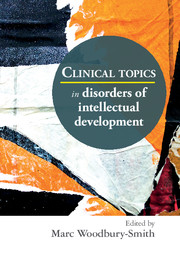Preface
Published online by Cambridge University Press: 01 January 2018
Summary
The practice of medicine has seen significant changes in recent years, the result of scientific advances in diagnosis and treatment, as well as more general changes in the pattern of disease in our ever-expanding population. Psychiatry itself has undergone more fundamental changes, due in part to recent modifications in classification (DSM-5, and forthcoming in ICD-11) and greater clinical subspecialisation. Moreover, for a variety of reasons comprising both well-elucidated factors and those that are poorly understood, the prevalence of mental disorders continues to rise, which has major implications for the healthcare budget of the nation.
My own specialty, the psychiatry of intellectual disabilities, has itself seen innumerable changes. It has risen in status from psychiatry's Cinderella subspecialty to one that embraces new technologies and scientific advances, in addition to benefitting from new legislation. This is acutely visible in relation to the care of individuals with autism spectrum disorder (ASD), which represents a significant component of the clinical workload of healthcare professionals in the psychiatry of intellectual disabilities. Advances in ASD's conceptualisation, diagnosis, comorbidity and treatment are increasingly incorporated into clinical practice, which includes the publication of evidenced-based guidelines. Generally speaking, the psychiatry of intellectual disabilities sits neatly on the interface of child and adolescent psychiatry, neurology and genetics, and, as a matter of course, it will be affected by developments in these specialisms.
Consequently, while we find ourselves at an exciting juncture in the care of the population of those with disorders of intellectual development (DID), a large body of literature exists that could impact on the clinical care we provide. By ‘we’ I do not refer principally to psychiatrists, but instead to all health and social care professionals working with this population. I believe that both clinicians and allied healthcare workers can benefit from research evidence being distilled down to the most important, clinically relevant points. Both can also profit from the availability of up-to-date references, as they provide the opportunity for broader and deeper reading, and it is with this in mind that the current volume was prepared.
Several of the chapters herein are revised and updated versions of previously published articles from Advances in Psychiatric Treatment.
- Type
- Chapter
- Information
- Clinical Topics in Disorders of Intellectual Development , pp. xi - xivPublisher: Royal College of PsychiatristsPrint publication year: 2015



